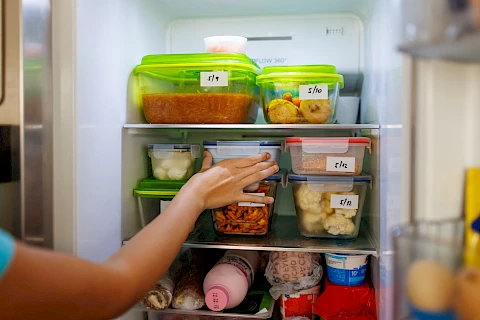
As our loved ones reach their senior years, their immune systems become less robust, making them more vulnerable to foodborne illnesses. Food safety is a priority for seniors as it can prevent serious health issues. We've put together some practical tips on safe for caregivers on safe food storage, preparation, and reheating practices. We'll also go over foods that pose higher risks for older adults and provide insight into mitigating these risks.
Safe Food Storage Practices
Proper food storage is the first step toward ensuring food safety for seniors.
- Keep your refrigerator at or below 40°F and your freezer at 0°F.
- Store perishable foods like meat, dairy, and leftovers in the refrigerator, and freeze items that won't be used within the next few days.
- Clearly label all stored foods with the date they were placed in the refrigerator or freezer.
- Use older items first and don't keep leftovers for more than four days in the fridge.
- When organizing the refrigerator, place raw meat, poultry, and seafood on the bottom shelf to avoid drips contaminating other foods.
- Keep ready-to-eat foods like deli meats and cooked leftovers on the upper shelves.
Healthy Food Preparation Tips
Avoiding foodborne illnesses requires careful food preparation. Always wash your hands with soap and water for at least 20 seconds before and after handling consumables. Make sure kitchen surfaces and utensils are clean, and use separate cutting boards for raw meats, fruits, and vegetables. Clean all cutting boards, utensils, and countertops with hot, soapy water after use.
Cook food at the correct temperature to avoid illness. Use a food thermometer to check that meats reach the appropriate internal temperature to kill harmful bacteria:
- Poultry: 165°F
- Ground meats: 160°F
- Fish: 145°F
Best Practices for Reheating Food
If you want to prevent foodborne illnesses, you need to know how to safely reheat meals. Heat leftovers to an internal temperature of 165°F—use a kitchen thermometer—ensuring that the food is steaming hot all the way through. When using a microwave, cover the food with a microwave-safe lid or wrap to retain moisture and ensure even heating. Stir the food midway through reheating to get rid of cold spots where bacteria can survive.
Mitigating Food Safety Risks
Certain foods are more likely to cause foodborne illnesses, especially in seniors. High-risk foods include raw or undercooked eggs, undercooked meats and poultry, unpasteurized milk and dairy products, raw shellfish, deli meats, and pre-prepared salads.
Apart from safe storage, preparation, and cooking, there are additional steps to reduce the risks. Stay informed about food recalls by checking credible sources like the Food and Drug Administration (FDA) or the U.S. Department of Agriculture (USDA).
Regularly clean kitchen counters, cutting boards, and appliances. Use a kitchen disinfectant, particularly in areas where raw meat has been prepared. Teach your senior loved ones about the importance of food safety. Explain why they should follow these practices and involve them in the process.
Need a Hand in the Kitchen? Count on Us!
Would your senior loved one benefit from assistance with food preparation and kitchen cleanup? Senior Helpers Louisville is here to help residents of Louisville, LaGrange, Crestwood, Prospect, and the greater Jefferson County area. Contact us today to learn more about our extensive in-home companionship and care services.